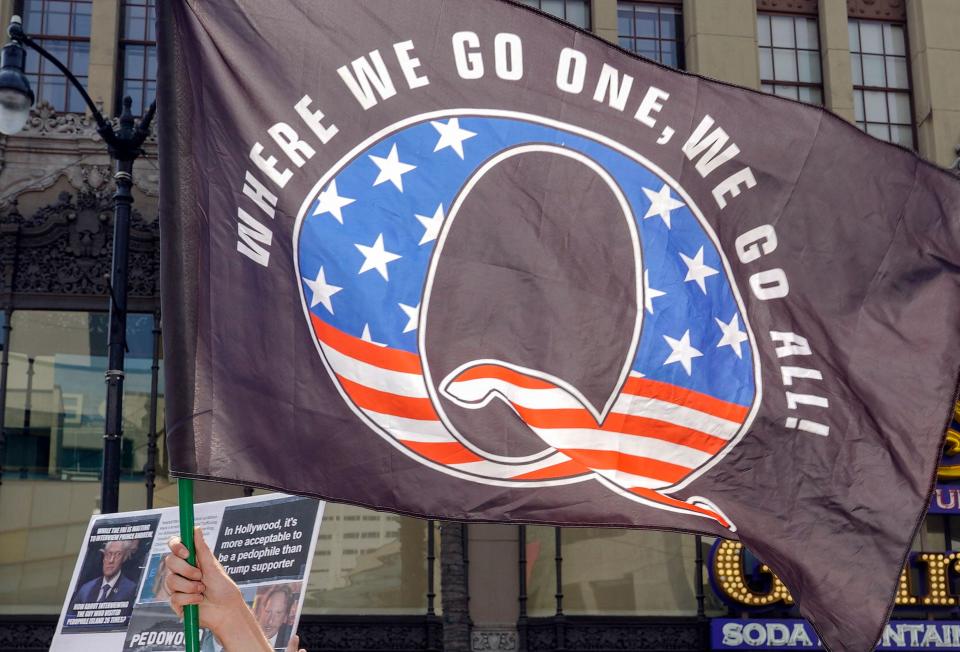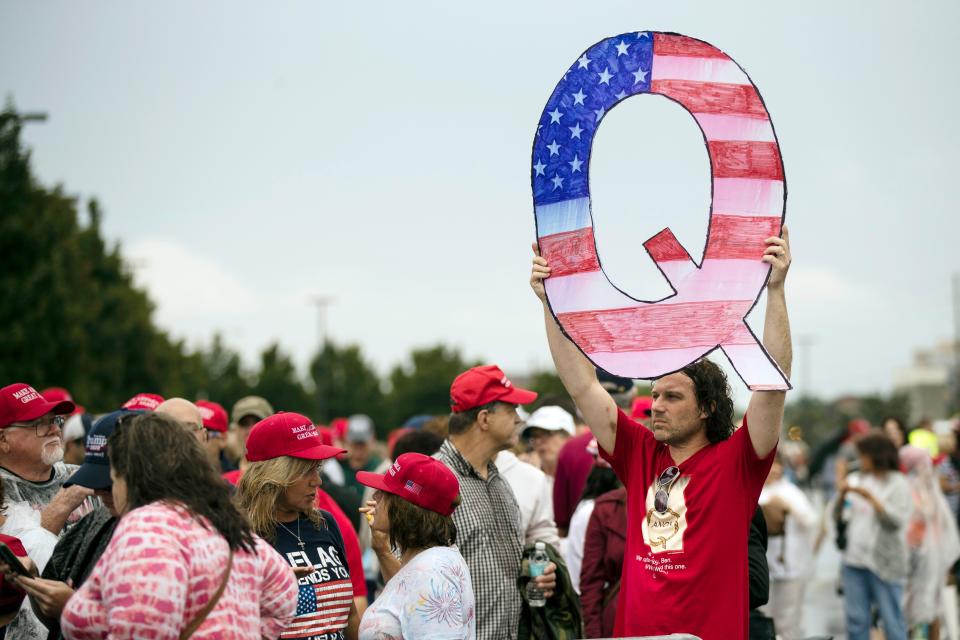In Trump embrace of QAnon, election experts see potential for midterm 'chaos' and more election denying
At a rally in Youngstown, Ohio this month for GOP Senate candidate J.D. Vance, dozens of supporters of Donald Trump held up an index finger in salute as the former president spoke.
Music played in the background, a song called "Wwg1wga” — an abbreviation for "Where we go one, we go all," the slogan for the QAnon conspiracy theory, which demonizes Democrats.
Former President Donald Trump's embrace of QAnon, including resharing QAnon conspiracy accounts to his millions of social media followers, risks eroding trust in American democracy and, potentially, fostering violence, experts say.
On Aug. 30, for example, Trump shared a post on his Truth Social platform from the QAnon account Patriotic American Alpha Sauce, falsely declaring Trump won the 2020 election. The former president added, also falsely, "FBI has advanced this fact even further!"
That is untrue. Joe Biden legally won the presidency.
Trump's promotion of QAnon is reinvigorating a conspiracy movement that has metamorphosed into election denialism over the past two years, experts told USA TODAY. His boosting of that kind of misinformation could help lead to problems from election denying candidates winning office up to violence in the November midterms.
Fact check: Joe Biden legally won presidential election, despite persistent contrary claims
Donald Trump refuses to condemn QAnon: Here's what to know about the far-right conspiracy theory

An August report from NewsGuard, an organization that rates the credibility of websites, found Trump has shared 30 QAnon-promoting accounts at least 65 times to his 3.8 million followers since April 2022.
Toeing the line: Donald Trump embraces QAnon again at North Carolina rally as ties to violence raise concern
Defund the FBI?: Why Republican rallying cry could boost Democrats in midterm elections
"QAnon today is a carcass of what it used to be," said Jared Holt, senior research manager at the Institute for Strategic Dialogue, a London-based think-tank.
Holt said the movement lost excitement and interest after its leader, Q, went silent in December 2020 after the presidential election (although Q reappeared in June). However, "the election denialism space has been a huge boon for some of these influencers, plugging them into new audiences."
What is QAnon?
QAnon supporters falseley believe there is a "Deep State" apparatus of satanic blood-drinking Democratic elites, business leaders and Hollywood celebrities who run a child sex trafficking ring. Followers believe that Trump's presidential election in 2016 helped to root out the fabricated cabal of pedophiles and cannibals.
The group's anonymous leader, Q, began sharing cryptic tips, known as Q drops, online in 2017 for followers to decode.
But the outlandish theories quickly spread to mainstream audiences and in 2020 helped to spread misinformation about COVID-19. A February report from PRRI found 16% of Americans are QAnon believers.
Now believers of the movement are hoping Trump will again become president and destroy the "Deep State." And Trump's coy embrace of QAnon is lending them more credence and hope, experts said.
Moderation concerns: Trump's Truth Social not approved for Google Play store

Believers, once relegated to far-right message boards including 4Chan and 8kun, spread to more mainstream social media platforms like Facebook and YouTube.
The movement has been linked to violent attacks, with the FBI declaring QAnon a domestic terrorism threat in May 2019, first reported by Yahoo News.
The U.S. has seen the QAnon movement and other extremist groups like the Proud Boys and Oath Keepers spread from the online world to the real world, most notably in the Jan. 6, 2021 Capitol riot.
One QAnon rioter was sentenced to 41 months in prison for his role in the riot. Another QAnon believer was sentenced to more than two years and four months in prison for threatening to shoot House Speaker Nancy Pelosi the day after the riot. This May, Ohio resident Adam Miller was hit with multiple charges around the Capitol attack. A relative told the FBI that Miller was a follower of QAnon, according to the Akron Beacon Journal.
2020 presidential election fallout: President Trump permanently banned from Twitter over risk he could incite violence
Trump embraces QAnon before and after FBI search
In the past, Trump has sidestepped questions about QAnon and refused to condemn the movement, telling NBC's Savannah Guthrie in 2020 he knew "nothing" about QAnon.
Trump retweeted QAnon promoting accounts at least 315 times before he was permanently suspended from Twitter on Jan. 8, 2021, according to Media Matters for America.
But now, Truth Social has at least 47 verified QAnon-promoting accounts with more than 10,000 followers, according to NewsGuard's report. There were a total of 88 unverified and verified accounts with more than 10,000 followers. Twitter previously banned 32 of those accounts from its platform, according to NewsGuard.
In one example, Trump reshared the QAnon-promoting account @GodandCountryy quoting former President John F. Kennedy, saying "I know there is a God-I see the storm coming and I see his hand in it- if he has a place then I am ready-we see the hand."
In the QAnon vernacular, “the storm” refers to the day when the Deep State network of child sex traffickers will be arrested by Trump and executed.
The latest political news: Sign up for USA TODAY's OnPolitics newsletter
Tens of thousands of QAnon Twitter and Facebook accounts, along with Trump, were banned in the aftermath of the Jan. 6, 2021, Capitol riot.
“We found with our report that a lot of these prominent QAnon supporters who were spreading these ideas on Twitter and other platforms back in 2020 are now doing the same on Truth Social with less blowback because there are less researchers and journalists on Truth Social,” said Jack Brewster, a lead author for the report.
Truth Social, which markets itself toward conservatives, has a much smaller reach than Twitter, Facebook, YouTube and Reddit. Truth Social is currently ranked #45 on the top iPhone free app download charts, far below Facebook at #4, according to Sensor Tower. And the social media platform was recently banned from the Google Play store over content moderation problems.
Text with USA TODAY politics: Elections news right on your phone, from our top reporters
Trump Media & Technology Group, creator of Truth Social, did not answer USA TODAY's questions about Trump promoting QAnon accounts. Instead, Shannon Devine, a managing partner at MZ Group, called USA TODAY's request for comment "actual malice."
QAnon threats to the electoral system
Experts worry QAnon conspiracy theorists could harm groups and volunteers who work on elections.
Law enforcement safety: Threats toward FBI, law enforcement were already on the rise. Then came Mar-a-Lago
"Adherents of QAnon have committed violence in the past, so it's always a concern," said Kathryn Olmsted, a professor of history at the University of California, Davis who studies conspiracy theories.
Olmstead said Trump previously toyed with Qanon. "He sort of winked at them, mentioned the 'storm' and refused to denounce them," she said. But now he's openly using their visual images on Truth Social and using their slogan, Olmstead said. "It's playing with fire."
In one example of Trump explicitly embracing QAnon content, he shared an image of himself on Sept. 12 wearing a Q lapel pin. The image also included the phrase “the storm is coming” and "Wwg1wga” the QAnon abbreviation for "Where we go one, we go all."
Biden speech: Does Biden risk a backlash after going on offense against MAGA Republicans in Pa. speech?
Local election officials are facing an unprecedented wave of threats and intimidation in the lead up to the 2022 midterms. A 2021 report from the Brennan Center for Justice found 1 in 6 election officials were threatened because of their job. Already pushed to their limits, some elections officials told USA TODAY they "dread" the 2024 presidential election.
Similarly, Mike Rothschild, a QAnon conspiracy theorist expert and author of the book "The Storm Is Upon Us: How QAnon Became a Movement, Cult, and Conspiracy Theory of Everything," said Trump's promotion of QAnon contributes to an "atmosphere of tension, that anything could happen, that there's going to be violence and there's so much chaos going on."
QAnon candidates running for Congress and local election roles
QAnon believers aren't just online. Many are running for office.
In 2020 two candidates out of 106 who expressed support for QAnon were elected to Congress: Reps. Marjorie Taylor Greene, R-Ga., and Lauren Boebert, R-Colo. This election cycle, 65 current or former congressional candidates are linked to QAnon, according to Media Matters for America, a left-leaning media watchdog group.
With some of these candidates already winning their primaries, it's almost certain that more QAnon supporting candidates will be elected to Congress after the midterms.
And it's not just on the congressional level. Many are running for governor, secretary of state, school boards and city councils.
What is QAnon?: What to know about the baseless, far-right conspiracy theory
"And some of these people have already said they will not certify any Democrat who wins. They wouldn't have certified Joe Biden," Rothschild said.
QAnon-promoting podcaster Terpsehore “Tore” Maras, for example, is running for Ohio secretary of state.
Media Matters President Angelo Carusone said a particularly worrisome part of the QAnon movement is the recruitment to the election judge pipeline.
Biden condemns extremism
President Joe Biden has become more vocal in condemning extremist violence. During a prime-time speech on Sept. 2 Biden explicitly called out the former president.
"Donald Trump and the MAGA Republicans represent an extremism that threatens the very foundations of our republic," said Biden.
Midterms: 'MAGA forces' determined to 'take country backwards,' Biden says in speech
But most experts said calls to tamp down extremism and QAnon believers are more effective coming from Trump—who has not indicated he will speak out against some of his most vocal supporters.
Craig, of the Institute for Strategic Dialogue, said that when social media companies actually enforce their own policies against QAnon conspiracists and other violent content, it is effective.
"We did see in 2020, that when they applied their policies and when they decided to make decisions behind the scenes, it did greatly reduce the spread of election disinformation," Craig said. "It did greatly reduce the spread of vitriol."
This article originally appeared on USA TODAY: Trump embrace of QAnon spurs fears of violence in midterms
